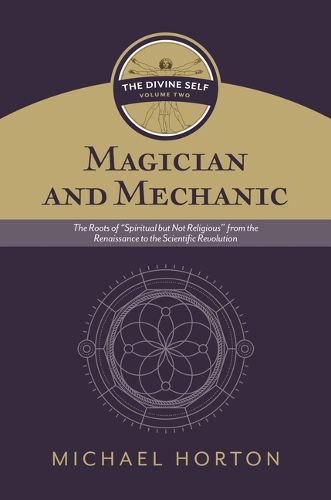Readings Newsletter
Become a Readings Member to make your shopping experience even easier.
Sign in or sign up for free!
You’re not far away from qualifying for FREE standard shipping within Australia
You’ve qualified for FREE standard shipping within Australia
The cart is loading…






A stunning history of "spiritual but not religious" thought in Western culture
In this second volume of The Divine Self series, Michael Horton explores changing conceptions of the divine self during the historic period from the Renaissance to the Scientific Revolution--a tumultuous era of rethinking humanity's relationship to God and nature.
In Horton's telling, this period is characterized not by steady diminishment of magic and orthodox religion and a corresponding rise of rational science, but rather by lively and productive interaction between these influences. Horton examines what is at stake for the divine self in this growing tension between magicians and Baconians, and what role each plays in the development of the modern self. He analyzes the work of renowned historical figures--Luther, Erasmus, Descartes, and Hobbes, to name a few--but also illuminates the activities of lesser-known individuals and groups that were profoundly influential in their time. From the gardens of Renaissance popes and dukes to Newton's alchemical pursuits, life during this period is characterized by an intense search for the sacred and a desire for fullness--forces that lay the groundwork for the "spiritual but not religious" phenomenon as we know it today.
Magician and Mechanic occupies an important place in a monumental three-volume study of the divine self. The first volume surveys antiquity through the late Middle Ages; the third volume (forthcoming) will span the eighteenth century through the present day. When the series is complete, The Divine Self will stand as the authoritative guide to the "spiritual but not religious" phenomenon in Western culture.
$9.00 standard shipping within Australia
FREE standard shipping within Australia for orders over $100.00
Express & International shipping calculated at checkout
Stock availability can be subject to change without notice. We recommend calling the shop or contacting our online team to check availability of low stock items. Please see our Shopping Online page for more details.
A stunning history of "spiritual but not religious" thought in Western culture
In this second volume of The Divine Self series, Michael Horton explores changing conceptions of the divine self during the historic period from the Renaissance to the Scientific Revolution--a tumultuous era of rethinking humanity's relationship to God and nature.
In Horton's telling, this period is characterized not by steady diminishment of magic and orthodox religion and a corresponding rise of rational science, but rather by lively and productive interaction between these influences. Horton examines what is at stake for the divine self in this growing tension between magicians and Baconians, and what role each plays in the development of the modern self. He analyzes the work of renowned historical figures--Luther, Erasmus, Descartes, and Hobbes, to name a few--but also illuminates the activities of lesser-known individuals and groups that were profoundly influential in their time. From the gardens of Renaissance popes and dukes to Newton's alchemical pursuits, life during this period is characterized by an intense search for the sacred and a desire for fullness--forces that lay the groundwork for the "spiritual but not religious" phenomenon as we know it today.
Magician and Mechanic occupies an important place in a monumental three-volume study of the divine self. The first volume surveys antiquity through the late Middle Ages; the third volume (forthcoming) will span the eighteenth century through the present day. When the series is complete, The Divine Self will stand as the authoritative guide to the "spiritual but not religious" phenomenon in Western culture.